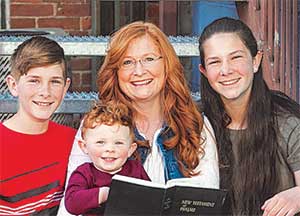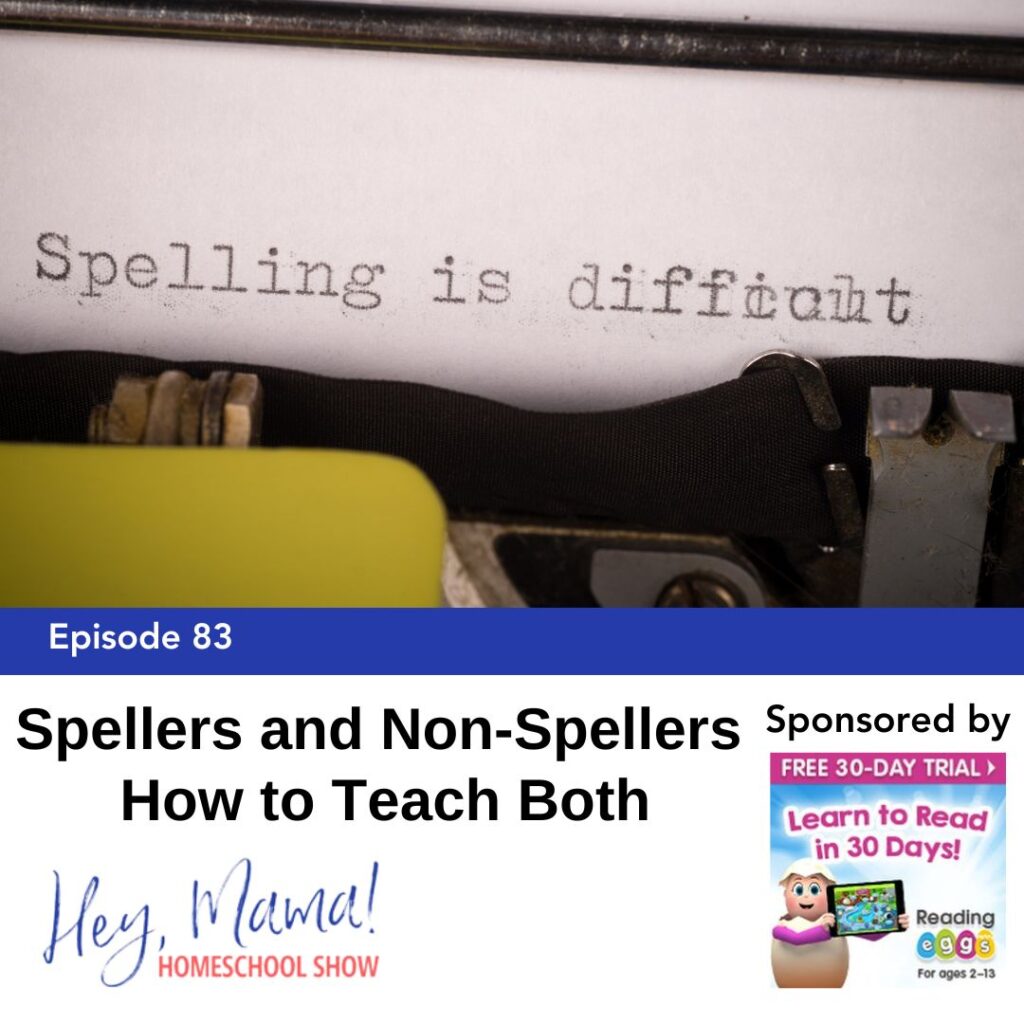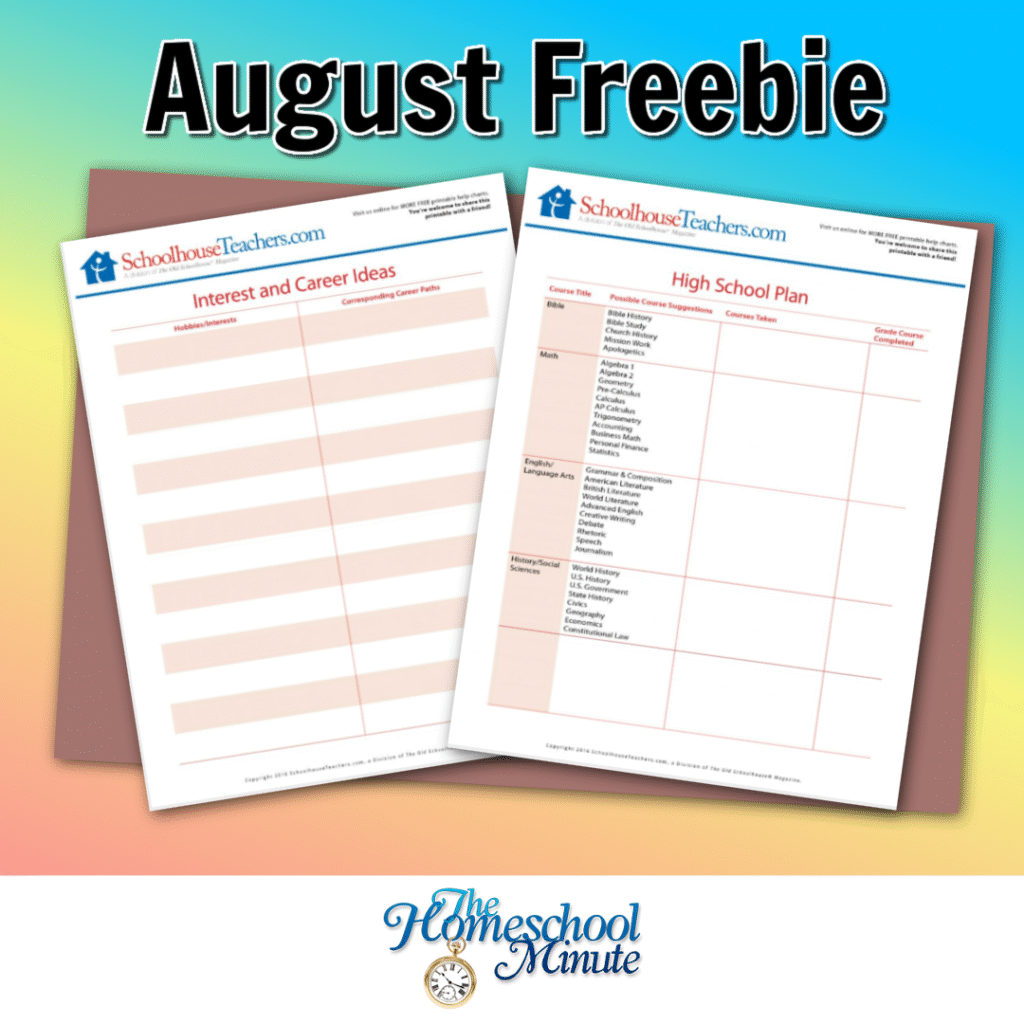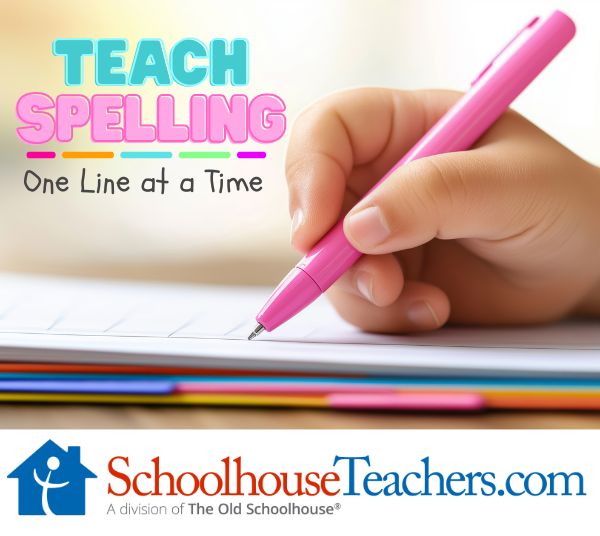August 27, 2025 – Spelling Is Caught and Taught


Spelling Is Caught and Taught
August 27, 2025
Deborah Wuehler
Your Child is Naturally Gifted
Heather Vogler
Home Is Our Training Ground
Alexandria Letkeman
Teaching Spelling Basics at an Advanced Level
Brigitte Brulz
Are You Wrestling With Spelling?

Mercy Every Minute
Deborah Wuehler, TOS Senior Editor
Your Child is Naturally Gifted
Thirty‑plus years of teaching spelling has taught me one thing: some children are natural spellers and some need help all the way through high school and beyond. This meant that each child needed differing amounts of help. With eight children, I have had several naturally gifted spellers and a couple of spellers that just never got it, but are naturally gifted in other areas such as creativity, art, mechanics, or music.
One of the beauties of homeschooling is that you can cater to each child’s ability or developmental levels, as well as explore where they are naturally gifted. God has created each of your children for good works that He has prepared in advance for them to do (Ephesians 2), and not all of those good works require good spelling.
People always ask what curriculum I used for spelling for all these students of mine. That depended on each student, but here are some things I did with most of them.
- Language Arts: Pathway Readers with workbooks that included spelling words
- Rod and Staff spelling workbooks
- Spelling Power for lists of words by level
- Writing: We used misspelled words within their own writing as spelling lists for practice.
- Reading: Reading good literature often helps develop the memory needed for spelling as they have seen and understood the vocabulary away from their spelling programs.
- Copywork: Copying Scripture and good literature helps the photographic memory part of the brain.
What seemed to work best for me was consistency. A little bit of spelling four or five days a week, every month of every school year, and they grow up spelling fairly well.
If you have a struggling speller, here are some helpful articles:
Spelling Can Be Easy! by Dianne Craft
How to Lose Those Spelling Blues by Nancy Pecci
Master Spelling and Grammar by Nancy Doran
Never fear! Lack of a natural spelling ability will not hinder the good works God has for your child to do. Enjoy this journey with your God-gifted children as you keep them Home. Where They Belong.
~Deborah
(Copy this link to share this article with a friend.)

Meet C.S. Lewis and John Knox, and explore how God uses ordinary people to do extraordinary things! Free activities and worksheets available for download. https://bit.ly/4moSr3E

Heather Vogler
Home Is Our Training Ground
Appliances like to play games with me. I am convinced that once our family has nestled down into our beds, they begin to scheme, daring each other to be the first to drive me crazy. The kitchen appliances usually win. My husband finally decided to scour the internet for used restaurant equipment to replace these pesky kitchen appliances with industrial ones. They make cooking and cleaning much more efficient, but they are huge. Fortunately, the massive size of my refrigerator gives me plenty of open magnetic space for my children’s artwork to be hung with pride—all of it. There is even room for a large magnetic whiteboard.
Now the kids can write down when an item needs to be restocked. The first time that I saw someone write that we needed “suger,” I immediately grabbed the dry-erase marker and rewrote, “sugar.” My thought process was not so much in teaching mode, but in “What will guests think?” mode. I was more concerned that a visitor would think I was a terrible homeschooling parent who can’t teach spelling, rather than using the misspelled word as a teaching opportunity.
I have used the same spelling program for all five of my kids. It is a proven and effective system that we are able to easily add to our routine. I have learned now to humble myself and realize that kids are going to make mistakes—and that’s okay! I just take words like “sugar” and add them to the list as we work through their words, and they never even realize those words were not technically supposed to be there that week! Now, each night I can go to bed in peace knowing that neither appliances nor misspelled words are going to drive me crazy!
(Copy this link to share this article with a friend.)
About the author
Heather Vogler, her husband, and five children call the Blue Ridge Mountains of Virginia home where they homeschool and homestead. Heather has homeschooled her children from the beginning and enjoys an eclectic style of teaching. As a freelance writer she has been published in Focus on the Family Magazine, War Cry Magazine, and Brio Magazine. Heather holds a BA in Christian Ministries and currently writes at ThriftSchooling.com.
Whether your child devours books or needs a little encouragement to read, fresh titles can spark their interest. If your home library could use an update, don’t miss the “Recommended Authors Directory” in the summer issue of The Old Schoolhouse Magazine®. Check out all three pages to find a wide range of talented authors and inspiring books to engage readers of all ages and interests.

Alexandria Letkeman
Teaching Spelling Basics at an Advanced Level
By the time our kids hit high school, most of us assume being able to spell correctly should already be second nature since it’s generally a skill mastered in elementary school. But for some teens, especially those with dyslexia or processing challenges, it’s a daily struggle. If that’s your student, you’re not alone. And it’s not too late.
Instead of drilling endless word lists, the key at this level is to shift away from rote memorization and toward understanding how words work. Dive into word roots, prefixes, and suffixes that shape meaning and spelling. Suddenly, words like photography and telephone make more sense when your child realizes photo means light and tele means far. Understanding that biology comes from bio (life) and logy (study of) gives spelling context, not just correctness.
Reading helps too, but don’t limit it to big novels. Comics, magazines, game manuals, even subtitles on shows can all reinforce spelling in low-pressure ways. The more your child sees words, the more natural spelling correctly becomes.
And if your teen struggles with traditional methods, try mixing it up. Let him trace letters in sand, use voice-to-text and back again, or engage with interactive apps that provide audio and visual feedback. These tools activate different parts of the brain and make spelling feel a lot less frustrating.
If your student feels discouraged, remind him that spelling is a skill, not a measure of how smart he is. Plenty of brilliant people have struggled with it and still succeeded (brilliant people like Thomas Edison, who was labeled “slow” by his teachers, for example). Encourage progress over perfection, celebrate small wins, and keep lessons brief but consistent.
High school is still a great time to build up confidence with words. With a few creative tools and a lot of encouragement, spelling can go from being a sore spot to a solid skill.
(Copy this link to share this article with a friend.)
About the author
Alexandria Letkeman began homeschooling with her family in middle school and has recently graduated with honors in 2020. Together with her husband, she has developed a passion for financial literacy, classical writing, and the freedom that homeschooling provides. In pursuit of those passions, she and her husband aim to continue the legacy of The HomeScholar and continue helping homeschool parents homeschool with confidence. One day, Alex plans to start a homesteading farm in Texas featuring mini cows.

Brigitte Brulz
Are You Wrestling With Spelling?
How do you teach a child spelling—especially when the English language throws you words like knife, receipt, colonel, and Wednesday? As a homeschooling parent, I wrestled with this question early on. I thought a separate spelling curriculum was essential. Spoiler alert: it’s not! That’s just one of many homeschooling lessons I’ve learned the hard way.
Thankfully, spelling doesn’t have to be all drills and tears. It can be taught in structured—and fun—ways, while also being caught naturally through everyday activities.
Spelling Is Taught
Structured teaching helps kids understand the “why” behind spellings. Start with phonics instruction and simple rules, like i before e except after c. Explore word families (cat, mat, sat) and patterns (light, fight, bright). Create mnemonics to make tricky words memorable—try “because: Big Elephants Can Always Understand Small Elephants.”
For hands-on fun, write words on paper, cut out the letters, and let your child rearrange them to form words. My kids loved this! (Pro tip: store each word’s letters in a separate bag to avoid confusion—another lesson learned the hard way.) Interactive courses like the iST courses on SchoolhouseTeachers.com and silly songs also keep learning lively (my daughter still sings the letters of her name even as an adult).
Spelling Is Caught
Read, read, and read some more—books, signs, journals, magazines, recipes, and even closed captions (can you find any errors?). Writing also reinforces spelling: try stories, grocery lists, or a parent-child journal (a cherished keepsake for me). Games like Scrabble, Boggle, and hangman are fantastic, too.
Above all, correct mistakes gently. A positive, low-pressure approach works wonders. With a mix of teaching and catching, spelling becomes a natural—and even enjoyable—part of learning!
(Copy this link to share this article with a friend.)
About the author
Brigitte is a veteran homeschooling mom, author, lesson designer, journal creator, and editor. Her book Pickles, Pickles, I Like Pickles was chosen for the 2019 Read Across Connecticut Program. Published online and in magazines, including The Old Schoolhouse® Magazine, Clubhouse, and Clubhouse Jr., she joined the SchoolhouseTeachers.com team as the quality assurance editor in 2021 and is now the editing coordinator. For more information, visit www.brigittebrulz.com.
A division of The Old Schoolhouse®
SchoolhouseTeachers.com Corner
Did you know?
Every class is INCLUDED for ultimate members!
No limits.
Want a natural way to build spelling and writing skills? Everyday Copywork uses meaningful passages to model grammar, vocabulary, and spelling—all while developing handwriting and attention to detail. Great for catching spelling in action!
Your Move. Call It.
Two unbeatable offers. One big decision.
Homeschooling just got more affordable—and more flexible. From now until September 2, choose the plan that fits your family best:
BOGO Annual Membership
Get TWO full years of SchoolhouseTeachers.com for the price of one for only $269.
Lifetime Membership
Never pay again. One payment of $990 (save $860!) with coupon code LIFE25. Done.
Two ways to save. One smart move.
Your move. Call it.


How well do you spell? Whether you are skilled in spelling or not, you can teach all your children spelling homeschool lessons with tips and advice from Deborah Wuehler. In Episode 83 of the Hey, Mama! Homeschool Show, Deborah shares a variety of resources from The Old Schoolhouse® Magazine, HomeschoolingFinds.com, and popular spelling curriculum resources. Find the show notes for “Spellers and Non-Spellers: How to Teach Both” on HomeschoolShow.com.
He would not stop crying. He had been sitting at the dining room table for fifteen minutes, but it felt like hours. It was a simple creative writing assignment—or so I thought. (Find this and other articles at HomeschoolApp.com.)

This month’s freebie is brought to you by SchoolhouseTeachers.com. Grab these two essential printables designed specifically for high school students:
Career and Interests Brainstormer: Helps teens identify their passions and begin mapping out potential career paths.
High School Year-at-a-Glance Planner: Encourages students to visualize their academic year, plan coursework, and set clear goals.
These tools are crafted to encourage your teens to take ownership of their learning journey—sparking meaningful conversations and thoughtful planning around both school and life beyond high school. Download, print, and use them today to boost your students’ independence and confidence!
Download your freebie.
Share this newsletter with a friend, and be sure to let those CONSIDERING homeschooling know about the enormous FREE info-pack which awaits them here: www.TryHomeschooling.com.
| We Want Your Feedback! |
| If you liked today’s Homeschool Minute, please email the editors and tell us what part you liked most. It’s a huge blessing to receive feedback! Please add publisher@theoldschoolhouse.com to your email contacts so that our emails to you don’t land in spam. |
DISCLAIMER: The Old Schoolhouse® and its staff do not necessarily endorse or agree with the articles, images, advertisements, or other content appearing in The Homeschool Minute, on any linked website, or otherwise. The views and opinions or other matters expressed in this newsletter are not necessarily those of the publishers, editors, staff, contractors, associates, or other affiliates of The Old Schoolhouse®





